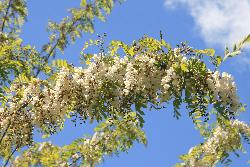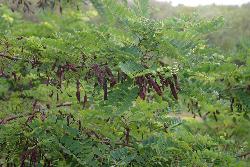- Taxon
- Weed
Habitat: bank, coast, dry, hill, lowland, margin, moist, open, riparian, river terrace, roadside, sand, shaded, sheltered, silt, slope, stone, terrace, wasteland
Dispersal: Seed, vegetative
Recognition
- a tree that loses its leaves during winter and usually grows up to 10 m tall.
- it produces large numbers of suckers from its root system and eventually forms dense thickets.
- two broad spines (5-25 mm long) are present at the base of some or all of its leaves.
- its alternately arranged leaves are once-compound and have 11-21 oval or oblong leaflets.
- its white (occasionally pink or purple) pea-shaped flowers are arranged in elongated clusters (10-15 cm long).
- its elongated and flattened pods (3-8 cm long and 10-15 mm wide) turn brown as they mature.
[From: Environmental Weeds of Australia]
Images
References
Connor, H.E. 1977: The Poisonous Plants in New Zealand. Edition 2. Government Printer, Wellington.
Howell, C. 2008: Consolidated list of environmental weeds in New Zealand. DOC Research & Development Series 292: 42.
Stewart, J. 1971: Plants in New Zealand Poisonous to Man. New Zealand Department of Health, Wellington.








